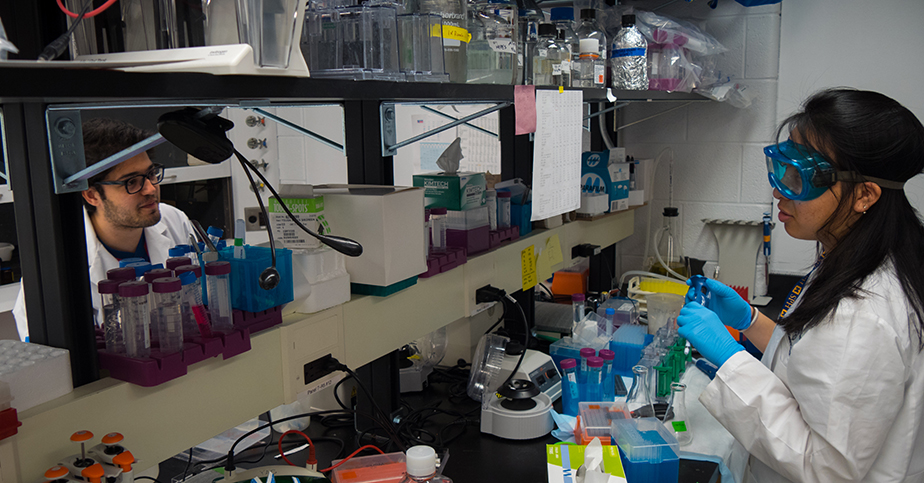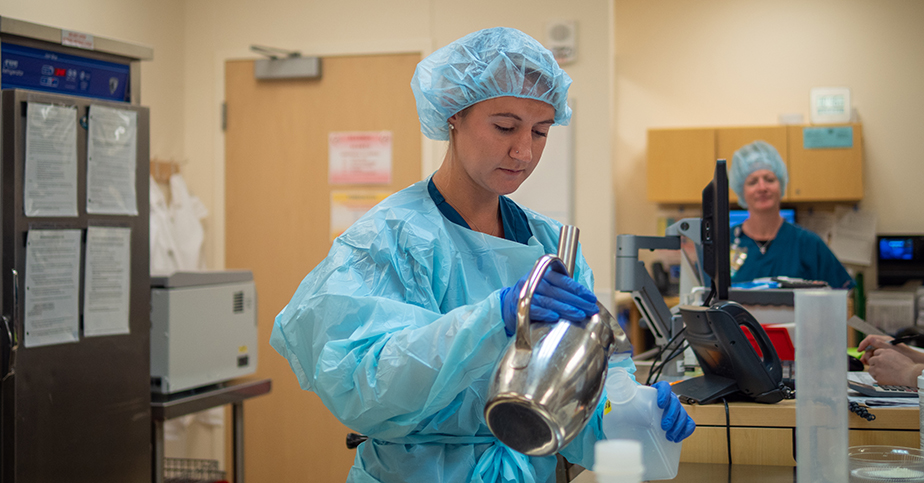Master of Science Degree in Nutritional Sciences
The two-year Master of Science (MS) in Nutritional Sciences degree is intended for students interested in pursuing academic or research careers in nutrition and related fields, including those looking to continue in doctoral programs.
Degree Options and Concentrations
The first choice MS students have is whether to pursue a dietetics concentration. This optional concentration has additional requirements as a path to the Registered Dietitian Nutritionist (RDN) credential.

MS in Nutritional Sciences
2-YEAR PROGRAM | 32-34 CREDIT HOURS | THESIS
The Master of Science in Nutritional Sciences* is a two-year, 32-34-credit-hour degree program intended for students with a strong interest in science and health who plan to pursue scientific careers in academia, research institutes, and governmental agencies, or as a step toward a doctoral program. A thesis is required with the goal of a published manuscript. Students will work alongside Nutritional Sciences faculty and a committee to complete their research.
The Master of Science in Nutritional Sciences offers students a rigorous research experience designed to support their academic and professional development via two tracks:
- Population Nutritional Sciences: This track emphasizes secondary data analysis using curated datasets from ongoing studies. With a highly structured curriculum and required coursework, this track is ideal for students with broad interests and/or those following the Dietetics subplan.
- Independent Nutrition Research: This track allows students to participate in a wide range of research activities, which may include laboratory work, primary data collection, or analysis of existing data. Students work closely with a faculty mentor to develop and complete a thesis project tailored to their specific interests.
All students are matched with a thesis project during their first semester, based on research availability and individual interests. Regardless of track, students collaborate with Nutritional Sciences faculty to conduct original research with the goal of submitting their work for publication.
The Master of Science in Nutritional Sciences is STEM OPT eligible.
*The dietetics subplan is an option with this degree for students interested in pursuing their Registered Dietitian Nutritionist (RDN) credential.

MS in Clinical Nutrition
2-YEAR PROGRAM | 50+ CREDIT HOURS | RESEARCH PROJECT
The Master of Science in Clinical Nutrition is intended for students wishing to complete an in-depth research project in the field of Clinical Nutrition while pursuing their Registered Dietitian Nutritionist (RDN) credential. By employing statistics, theories and evidence-based practice, students will focus on the prevention, diagnosis and management of nutritional changes in people with chronic disease, in healthcare or research settings. Students in this program can also choose to include an elective series.
The Master of Science in Clinical Nutrition program is OPT eligible, but not STEM OPT eligible.
Program Curriculum and Prerequisites
| Course Number | Credits | Course Name | Term |
|---|---|---|---|
| BIOSTAT 521 | 3 | Applied Biostatistics | F |
| EPID 600 | 3 | Introduction to Epidemiology | F |
| Select one of the following: | |||
| BIOSTAT 522 | 3 | Biostatistical Analysis for Health-Related Studies | W |
| NUTR 620 | 3 | Nutritional Biostatistics | W |
| Course Number | Credits | Course Name | Term |
|---|---|---|---|
| NUTR 630 | 3 | Principles of Nutritional Science | F |
| NUTR 631 | 3 | Metabolism of Vitamins and Minerals | W |
| NUTR 688 | 1 | Nutrition Seminar (year-long course) | |
| NUTR 698 | 6 | Research ** | |
| NUTR 699 | 1 | Thesis *** | |
| NUTR 701 | 3 | Research Methods in Nutritional Sciences | W |
| NUTR 640 | 3 | Nutritional Assessment | F |
| NUTR 869 | 1 | Innovations in Nutrition Research | F |
*May be exempt from previous coursework, but students must take at least two NUTR classes at Michigan during their degree.
**Students may elect NUTR 698 in any term but are required to complete a minimum total of 6 credits in this course to meet both departmental and program requirements.
***Master's Thesis: all MS students are required to perform a research project during the program, to write an acceptable thesis on the project, to present the research results in a seminar to defend the thesis before a committee of the faculty (see thesis guidelines).
| Course Number | Credits | Course Name |
|---|---|---|
| NUTR 601 | 1 | Interprofessional Education and Teamwork for the Nutrition Professional |
| NUTR 602 | 3 | Communication, Leadership and Management for Dietetics |
| NUTR 510 | 3 | Lifecycle Nutrition |
| NUTR 635 | 3 | Food Service and Culinary Science |
| NUTR 585 | 2 | Food Service Management |
| NUTR 636 | 2 | Medical Nutrition Therapy I |
| NUTR 637 | 2 | Medical Nutrition Therapy II |
| NUTR 640 | 3 | Nutritional Assessment |
| NUTR 642 | 2 | Community Nutrition |
| NUTR 646 | 3 | Nutritional Counseling |
- MS in Nutritional Sciences Course Schedule 2025-2027
- MS in Nutritional Sciences with Dietetics Subplan Course Schedule 2025-2027
- MS in Clinical Nutrition Course Schedule 2025-2027
Prerequisites
Applicants should have a strong interest in science and health, an undergraduate degree in a field of basic or applied science. Applicants are best prepared if they have taken courses in biology, physiology, general and organic chemistry, biochemistry, and calculus. The following are required:
- Calculus* or Statistics* (1 semester)
- Inorganic/general chemistry* (1 semester, lab not required)
- Organic chemistry (1 semester, lab not required)
- Biochemistry (1 semester, lab not required)
- Human Physiology (1 semester that includes digestion and endocrine) or Human Anatomy and Physiology (1 semester of each and must include digestion and endocrine, lab not required)
- Microbiology (for Dietetics students only, includes introduction of bacteria, viruses, parasites, and food or medical environment)
*AP high school courses are accepted based on AP final exam score
Prerequisite Requirements for Admission
You may apply with up to two missing prerequisites. If you are missing one or two prerequisites, your application can still be reviewed.
You may apply with three missing prerequisites, but your application will be considered incomplete and cannot be reviewed until you reduce the number of missing prerequisites to two or fewer.
- June 16, 2026: This is the deadline to submit at least one missing prerequisite so that your application becomes eligible for review (i.e., you're down to 2 or fewer missing).
- August 14, 2026: This is the final deadline to complete all prerequisites before New Student Orientation.
Funding Information
In addition to financial aid and funding opportunities from the School of Public Health, Nutritional Sciences MS students can receive financial support from the Rackham Graduate School. A separate application for Nutritional Sciences funding is not required.
How to Apply
- The Masters of Science in Nutritional Sciences program applicants must submit a Rackham Graduate School application.
- The Masters of Science in Nutritional Sciences with Dietetics subplan and Masters of Science in Clinical Nutrition programs must submit two applications: one through the Rackham Graduate School and another through the Dietetics Inclusive Centralized Application Service (DICAS). These applications request very similar information, so completing both should not take much extra time. It is highly recommended that applicants complete the Rackham application before the DICAS application.
All applicants must complete a brief interview. The interview is an asynchronous assessment in which you will be asked to submit timed responses to pre-recorded questions. You will access the interview online, on your own time, from a computer device equipped with a webcam and microphone. A link to the Kira interview system will be shared with you via email.
View more information here about the application process and deadlines.
More Information
For questions, please contact Keegan Gramza, Student Services Coordinator, at kgramza@umich.edu
